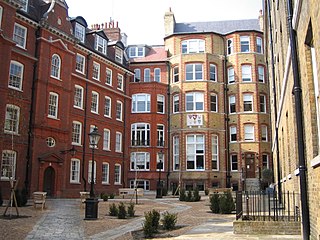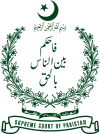Nasir–ul–Mulk (Urdu : ناصر الملک, Urdu pronunciation: [klmlʊ rsʊɳ] ; born 17 August 1950), is a Pakistani jurist, and the former professor of law who served as the 22nd Chief Justice of Pakistan and is the nominated caretaker Prime Minister of Pakistan. [2] Nominated as Chief Justice by the Prime Minister Nawaz Sharif, his appointment as CJP was confirmed by President Mamnoon Hussain on 6 July 2014. [3] [4] [5] Earlier, he served as the acting Chief Election Commissioner of Pakistan, from 30 November 2013 to 6 July 2014. [6]

Pakistan, officially the Islamic Republic of Pakistan, is a country in South Asia. It is the world’s sixth-most populous country with a population exceeding 212,742,631 people. In area, it is the 33rd-largest country, spanning 881,913 square kilometres. Pakistan has a 1,046-kilometre (650-mile) coastline along the Arabian Sea and Gulf of Oman in the south and is bordered by India to the east, Afghanistan to the west, Iran to the southwest, and China in the far northeast. It is separated narrowly from Tajikistan by Afghanistan's Wakhan Corridor in the northwest, and also shares a maritime border with Oman.

A judge is a person who presides over court proceedings, either alone or as a part of a panel of judges. The powers, functions, method of appointment, discipline, and training of judges vary widely across different jurisdictions. The judge is supposed to conduct the trial impartially and, typically, in an open court. The judge hears all the witnesses and any other evidence presented by the barristers of the case, assesses the credibility and arguments of the parties, and then issues a ruling on the matter at hand based on his or her interpretation of the law and his or her own personal judgment. In some jurisdictions, the judge's powers may be shared with a jury. In inquisitorial systems of criminal investigation, a judge might also be an examining magistrate.

The Chief Justice of Pakistan is the head of the court system of Pakistan and the chief judge of the Supreme Court of Pakistan. The Chief Justice is the senior most of 17 Senior Justices of the Supreme Court of Pakistan. From 1947 until 1960, the chief justice and senior justices were known as Federal Judge.
Contents
- Biography
- Education and background
- Academia and professional career
- Judicial career (1994–2014)
- Important cases
- Chief Justice of Pakistan (6 July 2014 – 16 August 2015)
- See also
- References
- External links
Prior to be elevated as Senior Justice in 2005, Mulk tenured as the chief justice of Peshawar High Court in 2004. [7] Since joining the supreme court, Mulk has taken textualist approach on human rights and non-discrimination issues. [8]
The Peshawar High Court is the highest judicial institution of Khyber-Pakhtunkhwa. It is located in the provincial capital Peshawar. The Parliament passed a bill extending the jurisdiction of the Supreme Court (SC) and the Peshawar High Court (PHC) to Federally Administered Tribal Areas (FATA), one of a handful of reforms paving the way for a merger of the tribal areas with Khyber Pakhtunkhwa.
Textualism is a formalist theory in which the interpretation of the law is primarily based on the ordinary meaning of the legal text, where no consideration is given to non-textual sources, such as: intention of the law when passed, the problem it was intended to remedy, or significant questions regarding the justice or rectitude of the law.

The situation of Human Rights in Pakistan is complex as a result of the country's diversity, large population, its status as a developing country and a sovereign Islamic democracy with a mixture of both Islamic and secular law. The Constitution of Pakistan provides for fundamental rights, which include freedom of speech, freedom of thought, freedom of information, freedom of religion, freedom of association, freedom of the press, freedom of assembly and the (conditional) right to bear arms. The Clauses also provide for an independent Supreme Court, separation of executive and judiciary, an independent judiciary, independent Human Rights commission and freedom of movement within the country and abroad. However it is debatable how much these clauses are respected in practice.
On 28 May 2018, he was appointed as interim prime minister ahead of the general elections scheduled in July 2018. [9]









